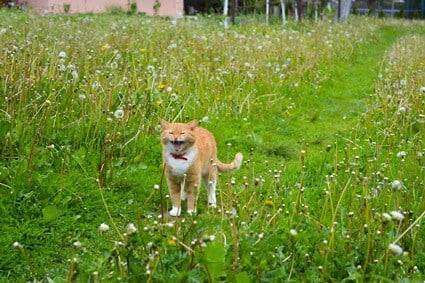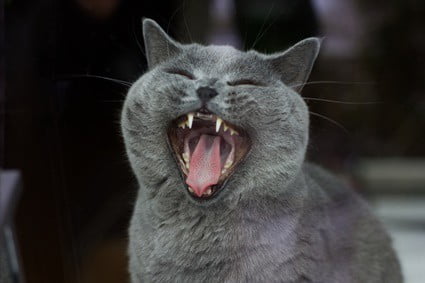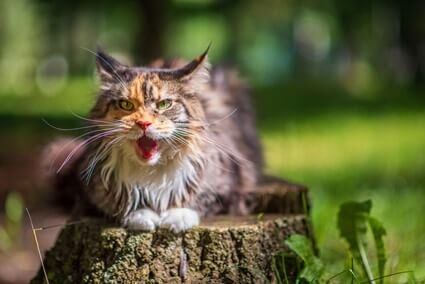Cats in heat display a range of behavioral changes. They undergo mood swings, are determined to leave the house, and become extremely vocal. A female cat yowling all day and night is most likely in estrus. She’s announcing her availability to local tomcats.
Your cat has a biological drive to mate, and her inability to do so defies her basic instincts. You can distract your cat with play, fun activities, and affection. You can also keep your cat calm with scents and music. However, don’t deviate from routine, as cats in heat can become distressed.
The only way to cease a cat’s heat cycle is spaying. If you choose not to do this, vocalization is something you’ll have to tolerate. Do what you can to make your cat more comfortable during these hormonal surges, as this will reduce the noise your cat makes.
Why Is My Cat Meowing Non-Stop All of a Sudden?
If your cat is constantly verbalizing, it’s trying to tell you something important.
It may be hungry or stressed, but an unspayed female cat is most likely in heat. This constant vocalizing is an attempt to attract intact males.
If you’re unsure about whether your cat is in heat, check for these signs:
- Mood swings
- Loss of appetite
- Constant marking
- Excessively grooming the genitals
- Inability to settle
- Desperation to escape the home
A cat in heat must be kept indoors. It doesn’t take long to find a tom and mate, which often results in pregnancy. Unfortunately for owners, this means a prolonged period of meowing and yowling.
Why Do Cats Make Weird Noises at Night?
A cat in heat will be particularly vocal after dark, so your cat will make loud, ear-piercing wails. To the untrained ear, it sounds like your cat is in pain. This yowling sound is known as caterwauling.
Caterwauling is an unmistakable message to local tomcats. Your cat is announcing that she’s available to male cats seeking a mate. Caterwauling occurs at night as the streets are largely quiet and empty.
Caterwauling is not one-way communication, so male cats will respond by meowing loudly.
My Cat is in Heat and Won’t Shut Up
If your cat is in heat, she’ll be instinctually noisy. Verbalizing is as natural as breathing to a cat in heat.
Brace yourself for some sleepless nights. A cat in heat can display bursts of affection, which means she may be more playful. Tire your cat out before bed to give yourself a fighting chance of a quiet night.
In addition, there are steps you can take to quieten your cat down. The aim is to keep your cat as calm and comfortable as possible. Don’t expect silence, though.
These techniques will reduce vocalization:
Stick To Routine
A reliable, dependable routine is pivotal for all cats, which goes double for a cat in heat. A cat’s hormones are firing on all cylinders during estrus, which means she’ll be easily distressed and upset.
While your cat is in heat, you should feed and play with her at the expected times. She may show no interest, and that’s fine. Just ensure that she knows that nothing has changed. Don’t give your cat any reason to grow anxious, as this will result in constant meowing as she seeks reassurance.
Be vigilant about keeping your cat clean, including cleaning the litter box. Unsanitary conditions are a key stressor in felines. Stay on top of your duties, or your cat will be even noisier.
Distraction
A cat in heat only has one thing on her mind, so you need to do what you can to distract your cat.
Treat-based puzzles may redirect a cat’s mental focus. The idea of a reward can be motivational and distracting. While your cat is thinking about food, she may be quieter and more focused.
Food may not be as effective as cats in heat have a reduced appetite and are less interested than normal in eating. Catnip will provide a sense of bliss, offering short-term relief from a hormonal imbalance of estrus.
Cats in heat can experience bouts of aggression and frustration. Playing with your cat will tire your cat out and give her focus. This will prevent pacing, especially at night. If your cat sleeps more, she cannot attract a mate by calling out.
Distract your cat with affection. Don’t go too far as the cat will already be agitated, and unwanted handling can cause upset. If you strike the right balance, the only noise you should hear is contented purring.

Calming Music and Scents
The first step to keeping your cat calm is with music. The Journal of Feline Medicine and Surgery recommends cat-specific music, which acts as a lullaby for a tense, frustrated feline, reducing her desire to verbalize.
You can also appeal to your cat’s sense of smell with Feliway, which has proven calming properties. Essential oils, frankincense, lavender, and scented candles can also be beneficial in soothing a cat’s nerves.
How To Stop A Cat’s Heat Cycle
There’s no such thing as a cat in heat remedy. No pills, supplements, or herbal treatments will end the sequence. Only two things will end your cat’s heat cycle – mating or spaying!
Companion Animal recommends spaying before a cat enters puberty. The Journal of the American Veterinary Association agrees, stating that early spaying provides some health benefits.
Keeping your cat inside, ideally in a room with little light, temporarily delays the onset of estrus. This is good practice for keeping your cat in while she’s in heat. However, it’s not a sustainable, long-term solution.
Circadian rhythms govern the feline heat cycle, and your cat’s body will detect the onset of Spring due to prolonged spells of natural light. This will encourage her to enter heat as outdoor cats get more sunshine and enter estrus earlier than indoor cats.
You can spay a cat in heat, but many vets prefer not to, advising you to wait out the cycle. A cat in heat has a swollen, enlarged uterus, making surgery more difficult and increasing the risk of complications.

Phantom Pregnancy in Cats
Phantom pregnancy (pseudopregnancy) arises when a cat ovulates but doesn’t fall pregnant. The cat’s hormones make her believe that she’s pregnant.
The cat will undergo the same behavioral changes as a real pregnancy when this occurs. Your cat will be more affectionate and display nesting instincts, rejecting the company of male cats.
One-off pseudopregnancies don’t require medication. Your cat’s behavior will return to normal after about 3 weeks.
Will My Cat Stop Meowing After Mating?
At the very least, she’ll stop caterwauling. Your cat’s no longer attempting to attract a mate and will likely behave aggressively toward intact males.
If your cat has mated, she may be pregnant. Not every interaction with a tomcat will lead to pregnancy, but it’s likely. Signs of pregnancy include:
- Increased hunger
- Greater affection toward humans
- Swollen belly
- Bright, visible nipples (pinking up)
- Nesting behavior
A pregnant cat will give birth to her litter in about 60 days. The average litter size is 4, but it can be as many as 12. Kittens cannot be separated from their mother for 8 weeks.
Is My Male Cat in Heat?
Male cats don’t enter heat cycles. A male cat that’s meowing and yowling constantly cannot be attributed to estrus.
It may be related to a desire to mate, as intact male cats never lose the urge to procreate, which can be frustrating for an intact tomcat.
Unless you plan to breed a male, neutering is highly recommended. Most males become calmer and less territorial after this procedure, and this means your cat is less likely to roam for miles, potentially getting lost or hurt.
If your cat is in heat, she’ll be vocal, which you’ll need to live with for a while. Spaying is the only permanent fix, and if that isn’t an option, make your cat comfortable and distract her. The season will end eventually and provide you with some welcome respite.

